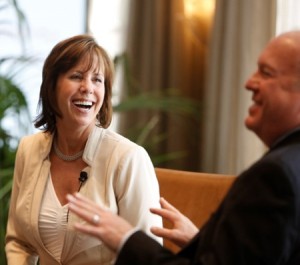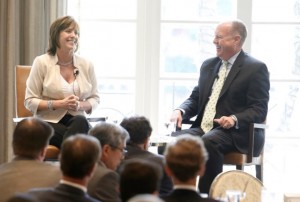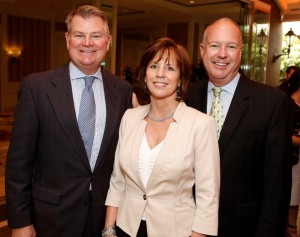 Be Fearless! What if failure is not a limitation? Set audacious goals. Take bigger risks. Make bigger bets. Be bold. Let urgency conquer fear. These are powerful words. How did you get into this? How did you decide to dedicate your life to philanthropy? These were my opening questions to Jean Case, CEO of The Case Foundation, at the USC Center on Philanthropy and Public Policy’s Distinguished Speakers Series luncheon. Her answer: “what drew me to philanthropy, the root of it, was that I was an early recipient of philanthropy. People’s time and people’s money. I was raised by a single mom, who raised four kids alone. And because of this we had some challenges, but we had a wonderful, beautiful, community come around us and lift us up and really create paths of opportunity for me. I was on a full scholarship to a private school which led me to a mentor who was first a judge, then a mayor and then a congressman. I worked at his office for a while. This would have never happened if there weren’t a lot of people like everyone in this room. Opportunity for all is a concept that is important to me as I started out on the other side. We have been fortunate to land on this side of life and there is nothing more that we want do than ensure that we can provide opportunities for others with the resources that we have.” This was such an honest, and from the heart, response that clearly defines who Jean is, her work, and the programs we discussed.
Be Fearless! What if failure is not a limitation? Set audacious goals. Take bigger risks. Make bigger bets. Be bold. Let urgency conquer fear. These are powerful words. How did you get into this? How did you decide to dedicate your life to philanthropy? These were my opening questions to Jean Case, CEO of The Case Foundation, at the USC Center on Philanthropy and Public Policy’s Distinguished Speakers Series luncheon. Her answer: “what drew me to philanthropy, the root of it, was that I was an early recipient of philanthropy. People’s time and people’s money. I was raised by a single mom, who raised four kids alone. And because of this we had some challenges, but we had a wonderful, beautiful, community come around us and lift us up and really create paths of opportunity for me. I was on a full scholarship to a private school which led me to a mentor who was first a judge, then a mayor and then a congressman. I worked at his office for a while. This would have never happened if there weren’t a lot of people like everyone in this room. Opportunity for all is a concept that is important to me as I started out on the other side. We have been fortunate to land on this side of life and there is nothing more that we want do than ensure that we can provide opportunities for others with the resources that we have.” This was such an honest, and from the heart, response that clearly defines who Jean is, her work, and the programs we discussed.
You got to this point through philanthropy, a good mentor, a good education, you had a very successful career at AOL that was at the forefront of the internet movement, but then you came back to philanthropy. Why did you pivot? “We were very much a mission driven organization at AOL. Many of us felt at the time that AOL would have been a nonprofit because what we were out to do was to democratize access to information, ideas and communication, to really level the playing field of opportunity. It was under my responsibility to oversee the AOL Foundation. And that was my toe in the water to the official world of philanthropy. We knew that when I retired that I would turn to philanthropy full time. So in 1997 we started The Case Foundation. What took me three to five years to learn were the very same things that led to success in business, and that they would likely be the things that would lead to success in philanthropy as well.”
“The Be Fearless campaign was really a reflection point, what did we see when we looked back, what have we learned, what are we seeing in the world, what has been done for sometimes hundreds of years trying to tackle problems, and what are some of the bright spots? We want to go to school on what’s worked, those bright spots. We developed the five principles of Be Fearless:”
1. Make Big Bets and Make History. Set audacious, not incremental, goals.
2. Experiment Early and Often. Don’t be afraid to go first.
3. Make Failure Matter. Failure teaches. Learn from it.
4. Reach Beyond Your Bubble. It’s comfortable to go it alone. But innovation happens at intersections.
5. Let Urgency Conquer Fear. Don’t overthink and overanalyze. Do.
Risk is an important part of their work. She talked about when you receive donations from others to do your programs, you get into “protectionist mode” and want to ensure that the funds are used successfully. When it’s “our own money” it’s different and you can experiment and as she said “experiment early and often.” To get people to open up and be comfortable about taking risks and making mistakes, they have Fail Fests. They share what has gone wrong, why and what they have learned. One of their learnings is that often the people being served don’t have a seat at the table, don’t have a voice, “but good luck getting the work right without their voice.”
 “Impact Investing as a Tool for Social Change” was the title for our conversation that brought together foundation executives and trustees, individual donors, corporate philanthropists, and nonprofit executives and board members. I mentioned that there are so many definitions of Impact Investing, and asked her, what is yours? She first told a story of what their friend Mark Andreessen originally thought of it. “It’s a houseboat… not a good house, not a good boat.” She then went on to say “investing in a new class of entrepreneurs that want to build a new class of businesses that will create financial as well as a social returns.” Some of those investments are nonprofit and come from the Foundation and some of those investments are for profit and come from Revolution, the company Jean’s husband, Steve Case (co-founder of AOL) runs. An example is Revolution Foods. They currently provided over one million meals to schools that are kid friendly, chef inspired, healthy foods. The company won that bid, not because it was an impact investment, but because it’s a great company, serving quality product with great results. When the Cases set out to do their budget each year, Jean and Steve talk about what they want to accomplish, they challenge their staffs to do the same. The legal entity/tax status is not part of the equation. It is the end result, the social benefit, which is the primary determining factor.
“Impact Investing as a Tool for Social Change” was the title for our conversation that brought together foundation executives and trustees, individual donors, corporate philanthropists, and nonprofit executives and board members. I mentioned that there are so many definitions of Impact Investing, and asked her, what is yours? She first told a story of what their friend Mark Andreessen originally thought of it. “It’s a houseboat… not a good house, not a good boat.” She then went on to say “investing in a new class of entrepreneurs that want to build a new class of businesses that will create financial as well as a social returns.” Some of those investments are nonprofit and come from the Foundation and some of those investments are for profit and come from Revolution, the company Jean’s husband, Steve Case (co-founder of AOL) runs. An example is Revolution Foods. They currently provided over one million meals to schools that are kid friendly, chef inspired, healthy foods. The company won that bid, not because it was an impact investment, but because it’s a great company, serving quality product with great results. When the Cases set out to do their budget each year, Jean and Steve talk about what they want to accomplish, they challenge their staffs to do the same. The legal entity/tax status is not part of the equation. It is the end result, the social benefit, which is the primary determining factor.
As impact investing is a fairly new concept, I asked if public policy is a barrier. “Yes. Policy is lagging.” I asked what we can do to help when speaking with policy makers. “Are we clearing the decks to allow and unleash private capital to address social challenges?” Jean offered three points that are critical for a good investment “Clear intention. Commit to measure. Must be transparent.” Circling the discussion back to philanthropy and its role with impact investing, she said “Philanthropy alone is under leveraged. You need to look at everything you bring to the table. What is the big idea, how do we use all of our assets to achieve our goals.” The Case Foundation is doing much to advance the field of impact investing. They support the impact investing ecosystem and provide opportunities to educate and activate investors. They created “A Short Guide to Impact Investing” as a basic primer to help investors better understand how business can drive change and create social impact.
 The Case Foundation is one of the few foundations that is focused on building the sector…philanthropy, volunteering, and civic engagement. They have been a catalyst in getting businesses to provide pro-bono support to nonprofits by helping to co-found A Billion + Change (a program of Points of Light). “We asked nonprofits what help they need to change their trajectory with scale and sustainability. They said we need some areas of talent that we don’t have and we can’t compete with the private sector. The areas include human resources, marketing, finance and technology. So we asked corporations to give $1 billion in pro-bono service in the areas that nonprofits need. Today there have been more than $5 billion worth of commitments by over 1,000 companies.”
The Case Foundation is one of the few foundations that is focused on building the sector…philanthropy, volunteering, and civic engagement. They have been a catalyst in getting businesses to provide pro-bono support to nonprofits by helping to co-found A Billion + Change (a program of Points of Light). “We asked nonprofits what help they need to change their trajectory with scale and sustainability. They said we need some areas of talent that we don’t have and we can’t compete with the private sector. The areas include human resources, marketing, finance and technology. So we asked corporations to give $1 billion in pro-bono service in the areas that nonprofits need. Today there have been more than $5 billion worth of commitments by over 1,000 companies.”
We closed out our time together with the questions: What are some current trends you are seeing in philanthropy? What impact do you think these trends will have on philanthropy in the long term? “I’m so excited about philanthropy, but what I am really excited about is something that we can’t even name. The world is disrupted. No matter what role you are in or what sector you come from, nothing is the same as it was, and we know that change is only going to continue to accelerate. So I think there is a way you can go about changing the world. You drive down in philanthropy, or maybe the public sector, what I love about hanging out with those young kids is that they’re unleashed from those silos. They see a world that is not about, are you government, are you nonprofit, are you philanthropy or academia, they just want to go change the world. If we look around the corner, what I think we might see are whole new classes of governance, maybe not necessarily nonprofit, not necessarily for profit, maybe hybrids, that’s what some of the social enterprises are. I just think we need to unleash ourselves from how it has been and think about what it needs to be going forward. I am super encouraged. I can’t wait for the future!”
We had a lively 50 minute conversation that also covered Millennials, the Giving Pledge, mentoring and more. Jean Case is truly a force of nature. Smart, compassionate, energetic, forward thinking all wrapped up in urgency! It was a pleasure to interview her and learn from her wisdom. The entire conversation is on You Tube: https://www.youtube.com/watch?v=MSiPxAzDQpE
